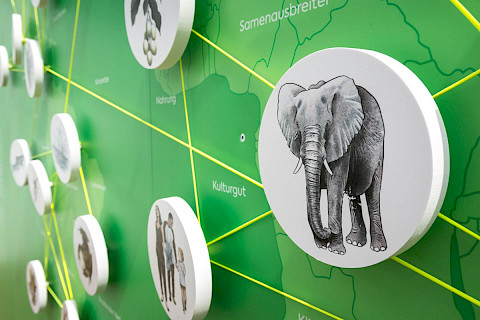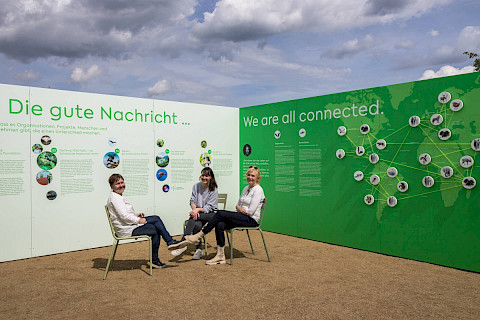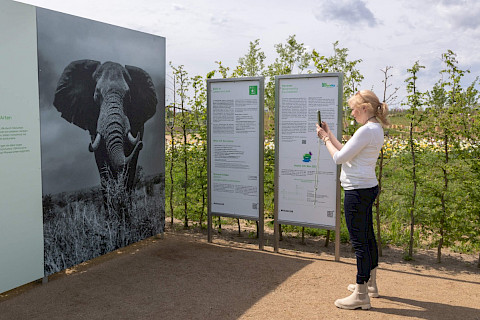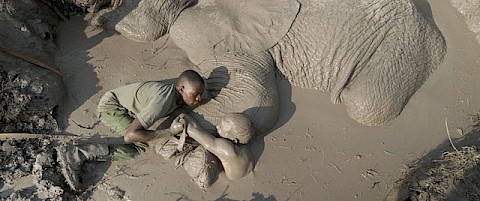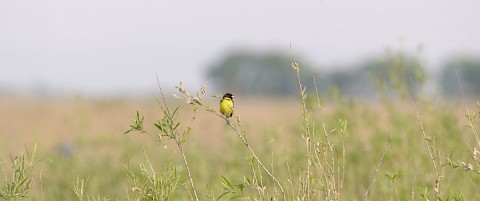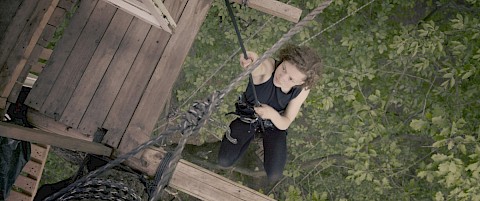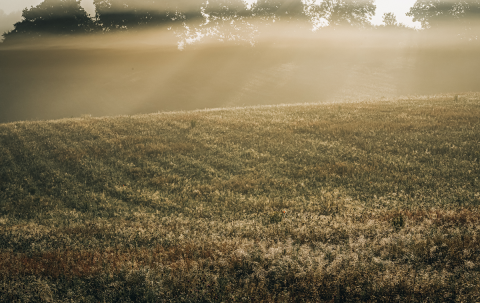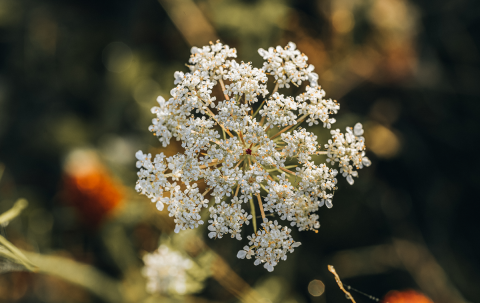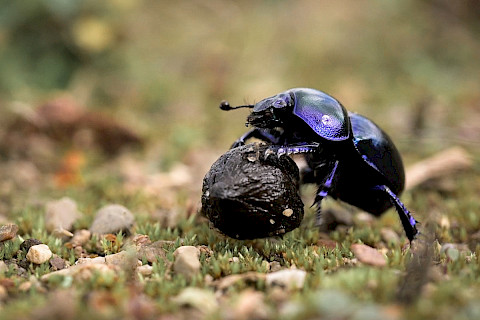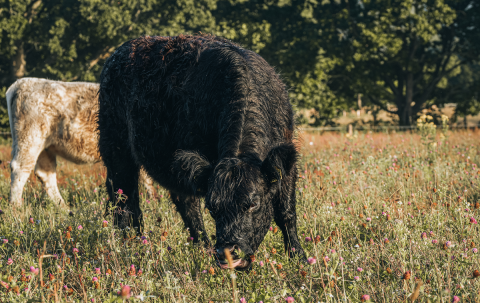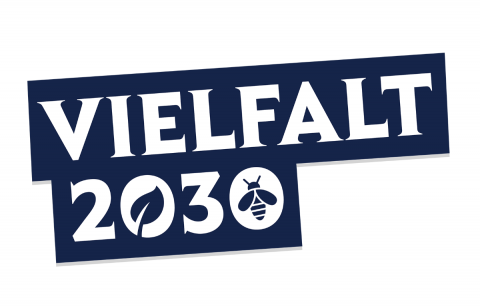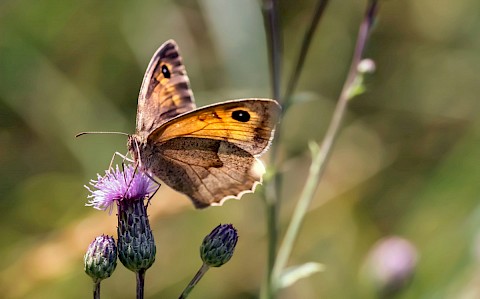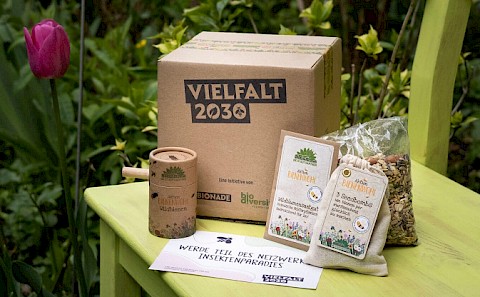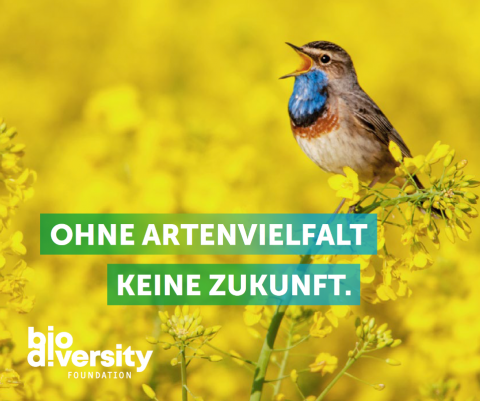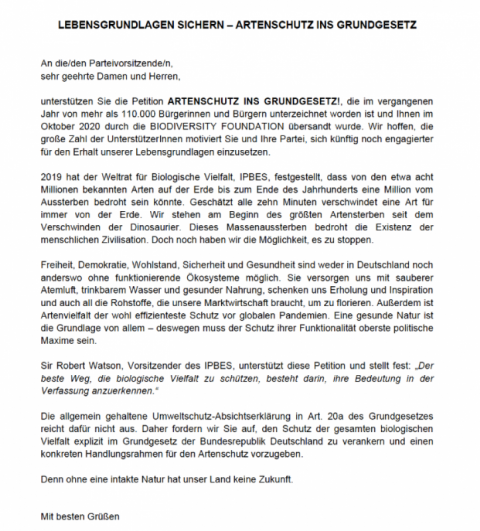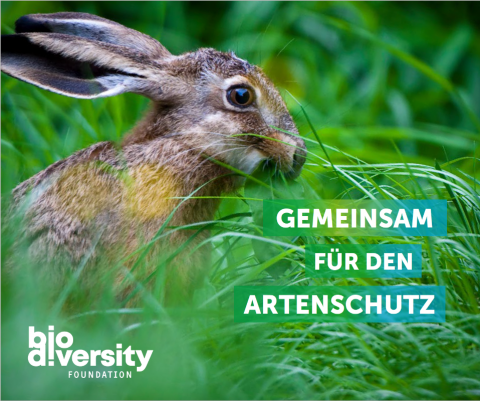Fighting together for species protection
Our projects are financed by your donations.
THANK YOU VERY MUCH for your support!
Exhibition BUGA 2023
Life on our planet consists of a network of innumerable individuals and millions of species that are connected to each other in ecosystems. Every species, small or large, plays an important role in this network.
Scientists assume that around 150 species are irrevocably going extinct every day and that our interventions in nature are the reasons for this loss of species. As we are part of this network, this has serious consequences for us humans. Because only intact ecosystems provide us with sufficient food, water, breathing air and medicine.
In order to make as many people as possible aware of the importance of biodiversity for our lives, we are a partner of the Bundesgartenschau 2023.
In a total of 17 gardens, the BUGA presents the 17 sustainability goals of the UN in a captivating and creative way. The sustainability goals were adopted by 193 UN countries in 2015 and are to be implemented by 2030.
Under the central idea "We are all connected", the Biodiversity Foundation together with the BUGA developed the concept for garden no. 15 "Life on land" and created its content. On a total of four exhibition walls, we show why the preservation of biodiversity is important to us humans and why we must protect each individual species - whether it is a mosquito or an elephant.
The highlight of the exhibition is a huge world map that stretches over a width of 8 m and impressively visualizes how all life on earth is connected. The connecting lines are represented by threads and illustrate the fragility of this life-sustaining network.
The Bundesgartenschau takes place from 14.04. to 08.10.2023 in Mannheim. We are looking forward to your visit!
Movie about species extinction
We are currently experiencing the greatest loss of species since the extinction of dinosaurs. As a consequence of human influences the natural extinction rate has increased by a thousandfold. The loss of biodiversity creates unforseeable risks for the entire human population because only a functioning ecosystem can provide sufficient food, water, air and medicine. Thus the fight against species extinction is one of the most urgent challenges humanity has to face in this century.
To remind us what is at stake and to show us how rich and unique our planet still is, we are currently creating an international movie about species extinction. By filming impressive scenes from Tansania, Russia, China, Germany and Norway an emotional and attention-grabbing movie will be produced that showcases the stories of conservationists worldwide and their daily fight to protect our planet. In personal stories urgent topics such as overfishing, energy policy, poaching and habitat destruction will be discussed. Scientists such as Jane Goodall and Edward Wilson or country representatives such as prince Haakon Magnus of Norway will put the stories into a wider context.
The rought cut of the movie has already been finished. Currently the film is being finalised with a planned release date in 2022.
Bird paradise
The "silent spring" has almost become a reality in Germany: since 1950 the number of birds declined by roughly two thirds and quite soon there could be more humans in Germany than birds. By now, half of our breeding birds are listed on the Red List of Threatened Species while many others already have disappeared.
Our industrialised agriculture, with its space requirements and use of fertiliser, herbicides and pesticides, is one of the drivers why there are fewer adequate habitats for birds. Today more than 50 percent of Germany's land mass is used for agriculture. Sadly, without sufficient natural living conditions the dying of birds will continue unchecked.
And the consequences for our ecosystems and human society are not yet predictable. A healthy bird population is vital for pest control, the functioning of a sustainable agriculture, and as a consequence for the security of our own livelihood.
The good news is: just by protecting or restoring relatively small areas we can help birds effectively, as long as these areas provide sufficient food resources and adequate nesting sites. According to the latest report "State of the World's Birds" from BirdLife International, restoring just 15% of croplands or pasturelands back to natural ecosystems could avoid 60% of expected bird and other species extinctions.
Our project: in 2020 we purchased an area of 3,7 hectars in Kosel, Schleswig-Holstein that was formerly used as a corn and grain field. The land is situated between different protected areas and could play an important role in the further protection of the region's ecology and bird life. As the field was extensively used for agriculture in the past and fertilsers, herbicides and pesticides were applicated excessivley not one breeding pair can currently be found in the area.
By restoring the area to its orignal natural state we aim to create the right conditions so that native bird species will find an adequate living environment and a new home on a longterm base. The project will be scientifically supported and evaluated by Dr. Frauke Fischer, lecturer in nature conservation at the University of Würzburg, and the expert team of the agency "auf"!
Together with the foundation "Naturschutz Schleswig-Holstein" we started the restoration of the former field in 2021 and we are hopeful that by 2022 first breeding successes might by possible.
Diversity 2030
In the last years the number of insects in Germany has rapidly declined. Threatened habitats, the use of pesticides in agriculture, increasing light pollution and climate change, are some of the possible reasons why there are fewer and fewer insects. But insects are indispensable for the balance and functioning of our ecosystems. Through pollination they secure the survival of roughly 90 percent of the world's flora and are an essential food source for birds and other animals.
Together with Bionade we founded the initiative "DIVERSITY 2030" with the common goal to turn 17 million square meters of green areas into insect friendly habitats by 2030. Through various projects and activities for more insect friendly balconies, gardens and public spaces we actively support the conservation of biodiversity in Germany.
And each of you can be a part of it! On the initiative's website "DIVERSITY 2030" we provide extensive background information and valuable tips how to protect your local biodiversity. Because each square centimeter that we cover with greenery, design species-appropriate or simply let nature take over helps to protect species and preserve ecosystems.
Become part of our initiative for more diversity and register your green area in our network "insect paradise". Together we can turn 17 million square meters into insect friendly habitats and help to support the biodiverstiy in Germany.
- Learn more about the network "Insect paradise"
PETITION "PROTECTION OF BIODIVERSITY"
In 2019 we started a petition to anchor the "protection of biodiversity" in the German constitution. With your help we were able to collect more than 110.000 signatures. In October 2020 all signatures were handed over to the leaders of the different parties of the German Bundestag together with a personal letter. At the same time we started a campaign that was launched in various online channels.
The petition attracted a lot of attention in the public, with the political parties and the responsible ministries and we are hopeful that our demand for more species protection will stimulate the political debate in Germany in the long term.
Thank you very much for your incredible support!
Our demand: Roughly one third of Germany's animal and plant species is threatened with extinction. The loss of biodiversity threathens the ecological as well as the economical future of our country. This is why the protection of biodiversity must be treated as a matter of highest priority and as such should be anchored in the German constitution. To achieve this we suggest to include a third common task in Article 91a of the basic german law.
"3. Improvement of the biodiversity protection and preservation of the ecosystem services."
The protection of biodiversity can only be achieved as a common task of the the federal government and the federal states since both parties alone lack the possibilities to take adequate measures. The suggested amendment of Article 91a would provide the necessary conditions for this.
Why do we want to change the basic german law? The protection of biodiversity is of existential significance for our future. Without biodiversity nature cannot provide us with the so called "ecosystem services", as for example the supply of clean air, drinking water or nutrient-rich soils. To secure these ecosystem services the biodiversity must be protected on all levels. The goal is that government and federal states work together on this task since the territorial and jurisdictional boundaries of the federal states cannot sufficiently address the natural functioning of ecosystems.
Contact
- BIODIVERSITY FOUNDATION
- Grindelhof 68
- 20146 Hamburg
- Germany
Donation Account
The BIODIVERSITY FOUNDATION projects are funded by your donations. Thank you for your support!
- IBAN: DE 38 2005 0550 100 228 90 96
- BIC: HASPDEHHXXX

